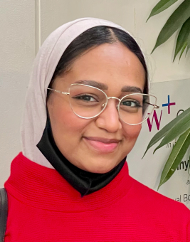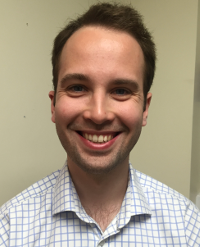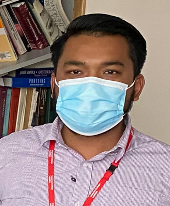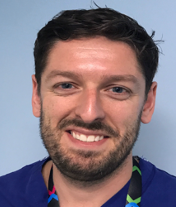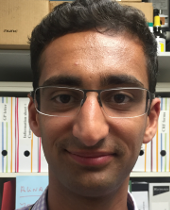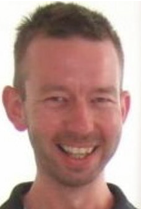
Contact
Doris.daby1@nhs.net (Research)
zyta.kraj1@nhs.net (NHS)
Lab/office contact number: 07385411242 / Ext: 58026
Dr Vizcaychipi’s group conducts clinical translational research, and the key areas of research are evidence based of neurocognitive function in Perioperative Care Medicine, Long-term psychological impact of medical admission to acute hospitals, Technology and Innovation on health behavior and identification of preventative cellular mechanisms of memory decline. The group collaborates with Robotic engineering, Data Science Group, Cybernetic Engineering, Neuroscientists, the Royal College of Art, and Computational engineering.
Dr Vizcaychipi is the Director of the Annual Magill Symposium and Magill Academic Series at Chelsea Campus Imperial College London.
What we do
We are involved in the discovery, development and application of innovative methods for clinical studies of brain biology, physiology and pharmacology, as well as experimental studies of Alzheimer models. Our aim is to develop methods that will make a significant impact on patient neurocognitive outcomes in the short to medium, and in the long-term following acute admissions to hospital. To that end we use virtual reality therapy (VET), music, neuroimaging as well as use of robots and data analytics (DA) in our research.
Why it is important
Our research aims to detect perioperative neurocognitive complications and delirium phenotypes quicker as well as to stratify patients more effectively to therapy, particularly in the context of innovative development and data integration in healthcare systems. The very rapid changes in physiological responses to acute illness and pathways associated with delirium means that we can in future predict long-term cognitive outcomes following introduction of clinical and non-clinical therapy at a much earlier stage than currently. Understanding brain physiology in different clinical settings will ultimately permit individualised care to be delivered to patients as soon as a risk is detected.
How it can benefit patients
Our work helps in diagnosis, prevention and management of delirium and development of perioperative cognitive complications.
Summary of current research
- Delirium
- Cognitive Dysfunction
- Brain monitoring and long-term neurocognitive outcomes
- Assistive robotic and innovative technology to control non-clinical variables affecting neurocognitive outcomes
The development of delirium in patients can be thought of in terms of organ failure. This metaphor has implications as new data has suggested that patients who develop delirium during their stay in hospital have increased mortality compared to patients who do not. Hence, it is paramount to predict the onset of delirium in acute patients.
One of the most poignant problems affecting patients following acute admission to hospitals is that of neurocognitive impairment. Cognitive difficulties can range in size from subtle to major deficits in executive function or working memory. Cognitive deficits from a wide range of medical conditions (from Parkinson’s disease to mild cognitive impairment, to the sequelae of major cardiac surgery have been shown to impact on Quality of Life (QoL). However, there is limited research into neurocognitive dysfunction following burns injuries and high-risk surgical patients, and none investigating the lasting effect on long-term QoL.
From monitoring the level of sedation, to measuring autonomic response variability following clinical and non-clinical interventions such as music, modification of environmental factors and use of virtual reality.
Robots are increasingly being adopted in healthcare to carry out various tasks that enhance patient care. The team has recently reviewed areas where robots are mainly used in clinical practice. aiming to prove the types of robots being used in healthcare and find where they are deployed. This line of work supports further innovative research and development of future technology to enhance patients’ care.
Information
- Funders
- Related centres and groups
- Internal collaborations
- External collaborations (UK)
- External collaborations (Europe)
- PhD Students
- Westminster medical School Research Fund
- CWplus (0833)
- BMA Foundation for Medical Research – J Moulton
- INNOVATE UK - Biomedical Catalyst
- Prince Sultan Military College of Health Sciences International
- Indonesia Endowment Fund for Education
- JRC grant fellowship / JRC Small Grants
- IC-AD-Network Centre for a basic science project
Commercial Funding
- Professor Daqing Ma’s laboratory (APMIC Section) – co-supervision of clinical research fellows (1 PhD complete), undertaking translational studies in the physiological response to stress. Co-applicant on Joint Research Committee (JRC) grant and a grant for UKRI (Feb/21).
- Dr Istvan Nagy’s laboratory (APMIC Section) – co-supervision of clinical research fellows (2 PhD student writing up, 1 MD (res) ongoing) undertaking translational studies in the immunology of pain and metabolomics in burns. We secured funds from Ministry of Health and Culture from Malaysia, and Prince Sultan Military College of Health Science, Saudi Arabia. Co-applicant on grants from the Joint Research Committee (JRC).
- Prof Masao Takata’s laboratory (APMIC Section) – co-supervision of clinical research fellows (1 MD (res) ongoing) undertaking translational studies in vivo cellular and physiological response to severe burns injuries. Main applicant on grants from the Joint Research Committee (JRC).
- Prof Yiannis Demiris’s robotics laboratory (Department of Electrical and Electronic Engineering) – co-supervision of clinical research fellows (1 PhD(res) ongoing) undertaking translational studies in prediction of peri-operative cognitive decline and human-environment context mapping in patients with cognitive deficits. Main applicant on grant from BMA and CWplus.
- Prof Zoltan Takats (Section of Computational and Systems Medicine) - co-supervision of clinical research fellow (1 PhD students writing up) as part of the Burns, Wound healing and regeneration network.
- Prof Magdalena Sastre’s laboratory (Faculty of Medicine, Department of Brain Sciences) – basic science research on molecular mechanisms whereby inflammation impacts on ageing-related neuronal degeneration. Co-applicant on Alzheimer Society grant and supervision of BSc students.
- Prof Suveer Singh, Critical Care Medicine (APMIC Section) – co-supervision of BSc and MREs students undertaking working on human behaviour and bias learning during utilisation of clinical data.
- Prof Claire Shovlin (Faculty of Medicine, National Heart & Lung Institute) – conducting clinical trials and developing genomics understanding of COVID-19 infection. Co-applicant on NIHR grant and co-supervision of a MSc student examining the effect of COVID-19 infections on the genomic profile.
- Dr Sophie Coronini-Cronberg (Faculty of Medicine, School of Public Health) –developing infographics and qualitative analytics of a hospital catchment population for Chelsea & Westminster NHS Foundation Trust to flag areas at high risk of COVID-19 infections.
- Dr Melody Zifhang Ni (Faculty of Medicine, Department of Surgery and Cancer) – investigating highly multi-disciplinary team working at the interface of research, clinical environments and technologies.
- Dr Martine Nurek (Faculty of Medicine, Department of Surgery and Cancer) – investigating investigates the cognitive biases that can lead to misdiagnosis and mismanagement of patients, and whether “decision support” (AI-based decision aids) can mitigate these.
- Prof Ben MacArthur, Director of AI for Science and Government and Deputy Programme Director for health & Medical Sciences and Turing fellow. Collaborative work on applied data science to standardise clinical care and improve data visualisation to improve efficiency in the NHS.
- Prof Mark Girolami, Professor of Civil Engineering, Royal Academy of Research Engineering, Christ College, University of Cambridge. Collaborative work on applied data science to standardise clinical care and improve data visualisation to improve efficiency in the NHS.
- Professor Mervyn Singh, Critical Care Medicine, University College London, Critical Care research database and real time data sharing within two different integrated Care Systems (ICS) and two different electronic medical records.
- Prof Slawomir Nasuto, Cybernetics Laboratory, Biomedical Engineering (University of Reading) We have been working on machine learning for effective manipulation in music computer interfaces.
- Prof Pallav Shah, Respiratory Medicine, Royal Brompton & Harefield Hospitals. We are working on images predictive modelling for long term COVID-19 complications in collaboration with SensyneHealth. This project is an ongoing project which will be adopted for other long-term respiratory complications.
- Prof Emeritus Ken Eason, Cognitive ergonomics, Executive director, Bayswater Institute, Independent evaluator who has reviewed and guided me with clinical translational projects and initial stages of clinical research involving robotics and artificial intelligence.
- Prof Subbah Pokhrel, Health economics, Brunel University. We have worked together on patients’ benefits component of clinical trials and long-term impact of research related interventions. Our initial work was in relation to the perioperative research into memory project and in the last year the impact of COVID-19 infection in developing countries.
- Dr Willam Maton-Howards, Director of the Bayswater Institute, formerly Department of Health Chief Research Officer. Dr Maton-Howards is an independent reviewer of my translational work and business cases when outcomes of research need to be adopted by the NHS.
- Prof Amber Young, NIHR Doctoral fellow, Population Health Sciences, Bristol Medical School, University of Bristol. We have been working on the Core Outcome Set for Burn Care Research and my interest in this group was to develop the foundation for research in critically ill burn patients.
- Prof Adam Waldman, Centre for Brain Sciences, University of Edinburgh, Scotland, our collaboration consists of using fMRI to investigate neuroinflammation, cognitive dysfunction, and quality of life, following a major burn injury and critical care admission. This work is under analysis and it is part of one of my PhD students work.
- Dr Valerie Page, West Herts Hospitals NHS Trust; Watford General Hospital. We have supervised academic clinical fellows, written book chapters and collaborated on clinical research on delirium and sedation in the intensive care unit. We are currently working on the Delirium Core Outcome Set. We hope this work resumes once the COVID-19 pandemics is fully controlled.
- Prof Danny McAuley (Queens University, Belfast). We have been exploring brain connectivity of human volunteers. The development of this work was put on hold as COVID-19 pandemic has interrupted all new lines of investigations.
- Prof Stephen Rees (Aalborg University, Denmark) we are investigating the use of machine learning for liberation of patients from mechanical ventilation. I have introduced the first clinical algorithm and secured MHRA approval for use in clinical research in 2017. The BEACON system is now in use in multiple clinical research studies in the UK. The protocol of our prospective multicentre study was published in the BMJ Open, 02 Sep 2020, 10(9)
- Associate Prof Nicoletta Nicolau (University of Nicosia, Cyprus) we are collaborating on biomedical signal processing, with emphasis on the study of electrical brain activity (EEG) during anaesthesia and various applications (e.g., brain-computer interfaces) and mental states (e.g., sleep) under different stress conditions.
- Dr P.J. Devereaux, Canadian Population Health Research Institute, Scientific Leader of the Anesthesiology, Perioperative Medicine, and Surgical Research Group and I have collaborated in multiple clinical research trials, from POISE-2, POISE-3, HipATTACK and Chelsea & Westminster has been the highest recruiter for these studies. Multiple manuscripts resulted from this collaboration and this research led to change in clinical practice and generated quality improvement projects that are currently led by clinicians and managers in the trust.
- Prof Daren Heyland, Queen’s and Kingston University, Ontario, Canada, we collaborate on multicentre clinical trials looking at severe burns’ patients and the effect of inflammation and catabolism on oxidative mechanisms. We have recruited more than 1,100 critically ill burn patients worldwide to the Re-ENERGIZE study and currently we are working on the pilot study looking at High dose Vitamin C in thermal injury.
- Prof Mette M Berger, University of Lausanne, Switzerland. We have initially worked on the burn training module for the European academy and since then we initiated collaborative work looking and metabolism of critically ill patients. The Burns work is currently part of the online training module for ESICM.
- Dr Evelyn Corner, OBE, Lecturer in Physiotherapy, University of Brunel, we have collaborated on clinical studies looking at recovery trajectory of critically ill burn patients and I contribute towards her critical care teaching module for MSc and BSc programme.
- Dr Susannah Leaver, Research Lead for Critical Care, St George’s Hospital. We have been investigating the effect of cognition, frailty, activity of daily living and comorbidities on outcomes of acutely admitted patients over 80 years in European ICUs. I was the local lead for this project which is now published in Intensive Care Medicine (doi: 10.1007/s00134-019-05853-1) This work served as a substrate to review admission to critical care following the first wave of the COVID-19 pandemic.
| PhD / MD Students | Title of Project | Name of Primary Supervisor | Name of Secondary Supervisor(s) if applicable |
|
Vijaya Danke (PhD) |
Underlying mechanisms of persistent orofacial pain associated with trigeminal nerve injury in burns | Dr Istvan Nagy | Dr MP Vizcaychipi Mr D Collins |
|
Deemah Nassir (PhD) |
Neuroinflammatory pathways in burn | Dr MP Vizcaychipi | Dr Istvan Nagy Mr D Collins |
|
Edward Watson (PhD) |
The neurocognitive and psychological sequelae of severe burns injuries and critical care admission. | Dr Istvan Nagy | Dr MP Vizcaychipi |
|
Asako Shida (MD) |
In vivo, cellular and physiological changes in severe burns injury. | Dr MP Vizcaychipi | Prof Masao Takata |
| COMPLETED | |||
|
Rizki Febrianto (PhD) |
Genetic and Molecular Alteration Events in Primary Sensory Neuron of MSK 1/2 Knock Out Mice Receiving Mechanical and Thermal Pain Stimuli | Dr Istvan Nagy | Dr MP Vizcaychipi |
|
Joshua Cuddihy (PhD) |
Metabolomics of Burned Skin | Dr Istvan Nagy | Dr MP Vizcaychip Mr D Collinsi |
|
Ahmed Al-Hindawi (PhD) |
Scanpath Comparison fromElectro-oculograph (EOG) and Saliency Mapping for the Detection of Inattention in the Intensive Care Unit (ICU) Setting | Prof Yiannis Demeris | Dr MP Vizcaychipi |
|
Dafydd Lloyd (PhD) |
Investigating the impact of anaesthesia and surgery on Alzheimer's disease and the potential therapeutic role of Statin | Prof Daqing Ma | Dr MP Vizcaychipi |
Researchers
Dr Marcela P. Vizcaychipi
/prod01/channel_3/media/images/people-list/MPV---Profile-Photo---Green-background.jpeg)
Dr Marcela P. Vizcaychipi
Honorary Clinical Senior Lecturer
Dr Istvan Nagy
/prod01/channel_3/media/images/people-list/Istvan-Nagy.jpeg)
Dr Istvan Nagy
Reader in Nociceptive Mechanisms
Professor Daqing Ma
/prod01/channel_3/media/images/people-list/Daqing-Ma.jpeg)
Professor Daqing Ma
Professor of Anaesthesia
Dr Matthieu Komorowski
/prod01/channel_3/media/images/people-list/MatthieuKomorowski-.jpeg)
Dr Matthieu Komorowski
Clinical Senior Lecturer

